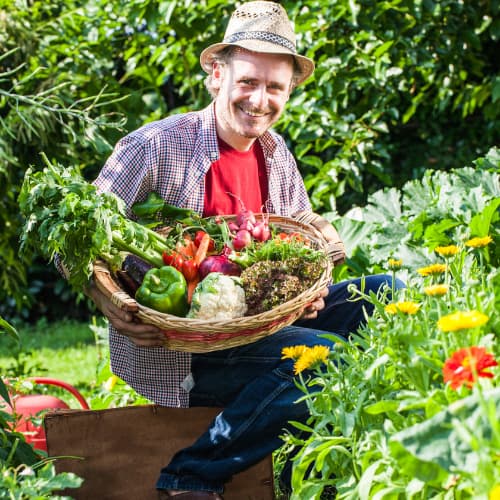
You Eat What Your Food Eats
The Importance of Nutritional Transparency

In today's health-conscious society, people are becoming increasingly aware of the link between diet and overall well-being. While most of us focus on the nutritional content of our food, we often overlook an essential aspect: what our food eats. Whether conscious of it or not, the nutritional value of the plants we consume is influenced by the quality of the soil they grow in, the nutrients they receive, and the farming practices employed.
As gardeners and food growers, we know the importance of pursuing healthy eating habits to live a healthy life. However, did you know your diet isn't just about what foods you put into your body – but also what your baby plants and crops consume? That's right! In this blog, we will explore how nutrients can affect the characteristics of your plants. From soil and fertiliser choice to harvest time decisions - it is clear that there is much more to growing produce than meets the eye!
The Benefits of Growing Foods

Growing your food is an enjoyable pastime and has numerous benefits. One of the most significant benefits is the high nutrient content of home-grown produce. When you grow your food, you have control over what you put into the soil/ water, which translates to better quality and more nutritious fruits and vegetables. Nutrient-dense foods provide the necessary vitamins, minerals, and antioxidants for a healthy and active lifestyle. In addition, growing your food allows you to avoid harmful pesticides and genetic modifications that can affect the nutrient quality of fruits and vegetables. Growing your own foods ensures that you and your family consume the healthiest and freshest produce.
Why adding nutrients to your hydroponic/soil garden is essential:
The connection between adding nutrients to our gardening practices and healthier food consumption is fundamental and significant. The food's nutrient content directly impacts our overall health and well-being. By consciously adding nutrients to our gardens, we can actively contribute to producing healthier, more nutritious food. Here are the critical aspects of this connection:
- 1
- Nutrient Density
Nutrient Density: Adding nutrients to the soil or hydroponic systems enhances the availability of essential elements for plant uptake. The food harvested from these well-nourished plants has higher nutrient density, providing a broader range of essential nutrients per serving.
- 2
- Balanced Nutrition
Adding nutrients to our gardens can ensure a balanced nutrient profile in the crops we grow. Plants require various nutrients, including macronutrients (nitrogen, phosphorus, and potassium) and micronutrients (such as iron, zinc, and magnesium). A comprehensive blend of these nutrients helps plants achieve optimal growth and development, leading to a well-rounded nutritional composition in the harvested produce.
- 3
- Improved Absorption and Bioavailability
When plants receive a consistent supply of nutrients, they develop robust root systems and efficient nutrient uptake mechanisms. This leads to improved absorption and assimilation of nutrients within the plant's tissues. As a result, the nutrients present in the food we consume from these plants become more bioavailable, ensuring that our bodies can effectively utilise and benefit from them.
- 4
- Enhanced Flavour and Aroma
Nutrients play a role in developing flavours, aromas, and sensory characteristics in fruits, vegetables, and herbs. Well-nourished plants tend to produce food with enhanced taste profiles, richer aromas, and more enjoyable culinary experiences. This can encourage us to consume a wider variety of nutrient-dense foods, leading to a more diverse and flavorful diet.
- 5
- Health Benefits
Consuming nutrient-rich food offers numerous health benefits. Growing and consuming nutrient-dense foods provides our bodies with the necessary components to maintain optimal health and potentially reduce the risk of chronic diseases. Adequate intake of vitamins, minerals, and antioxidants supports various bodily functions, including the immune system and cellular, cognitive, and cardiovascular health.
- 6
- Reduced Dependence on Processed Foods
By focusing on growing our nutrient-rich food, we can reduce our reliance on heavily processed and nutritionally deficient foods.
- 7
- Control over Pesticide and Chemical Use
When we add nutrients to our gardens, we control the overall cultivation practices more. This control extends to pesticide and chemical use, as well. By adopting organic or low-chemical gardening approaches, we can minimise exposure to harmful pesticides and potentially reduce the presence of chemical residues in the food we consume.

In conclusion, adding nutrients to our gardening practices directly impacts the nutritional quality of the food we consume. By actively participating in growing nutrient-rich food, we can improve our diets, promote healthier eating habits, and cultivate a deeper connection with our food.
